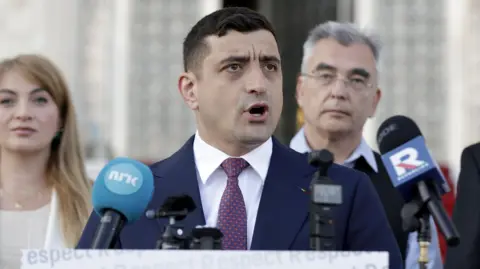The political landscape in Romania has undergone a significant shift following the recent presidential election rerun. Nationalist candidate George Simion has emerged victorious in the first round, capturing a remarkable 40% of the votes. This robust performance positions him as the frontrunner heading into the runoff scheduled for May 18, where he will face off against Bucharest’s liberal Mayor Nicusor Dan and Crin Antonescu from the governing coalition, both of whom garnered approximately 21% each and are tied in second place.
This latest election cycle comes on the heels of a controversial previous election, where a radical outsider, Calin Georgescu, claimed victory before that result was annulled due to allegations concerning campaign fraud and potential Russian interference. Following the closure of polls, Simion took to the airwaves to express his gratitude to voters, highlighting the act as one of courage and solidarity. He emphasized that this election transcends individual candidates and centers on the frustrations and grievances of Romanians who feel neglected and undervalued.
Simion is well-known for his admiration of former U.S. President Donald Trump, advocating for a strong NATO presence in Romania, including the maintenance of U.S. military bases and troops on Romanian soil. This inclination is particularly pertinent given the geopolitical tensions stemming from the ongoing conflict in Ukraine, which has made Romania a critical transit route for military supplies to the embattled nation. His emergence as a key figure has prompted reactions from both allies and adversaries in various global capitals, including Washington, Kyiv, and Moscow.
The circumstances surrounding the election’s rerun are indicative of the shifting dynamics in Romania’s political alliances and its ramifications on regional security. The U.S. has significant interests in Romania, including the missile defense system at Deveselu and three key airbases used for NATO operations. Analysts have expressed concern that Simion’s potential presidency could alter Romania’s foreign policy orientation, especially regarding its support for Ukraine. George Scutaru, a prominent security expert, alludes to a possible decrease in support for Ukraine if Simion ascends to the presidency.
In the context of public sentiment, Simion’s campaign has leveraged growing resentment over Romanian financial aid for Ukrainian refugees, positioning himself as a voice for those who oppose the current approach of the government. Despite his criticism of Romania’s involvement, he firmly denies any pro-Russian stance. Simion articulates a clear perspective on the Russian threat, referring to it as the “biggest danger” to Romania and neighboring countries.
In Bucharest, the atmosphere within the Cotroceni Palace gardens, a historical site that has become accessible to the public, reflects a dichotomy within Romanian society’s political mood. A recent poll indicates a blend of support for both Simion and Dan, highlighting voter desire for continuity amid political change. Young voters, disenchanted with established parties, resonate more with the emerging candidates like Simion and Dan, suggesting a broader re-evaluation of political identity among Romania’s electorate.
Visitors to the gardens express mixed feelings about Simion’s candidacy; while some originally supported him out of frustration with past administrations, others are now reconsidering their allegiance in light of recent developments and a potential shift in Romania’s European relationships. Public opinion is further complicated by the millions of Romanians living abroad who have already participated in the vote, potentially complicating projections based on domestic polling.
As the date for the runoff approaches, all eyes will undoubtedly be focused on Romania, as the outcome may serve as a litmus test not just for the nation’s internal dynamics, but also for regional stability and the future of Eastern European alliances. The implications of Simion’s presidency, particularly in relation to NATO and the ongoing conflict in Ukraine, will continue to occupy a central role in discussions across international corridors as the landscape evolves.



